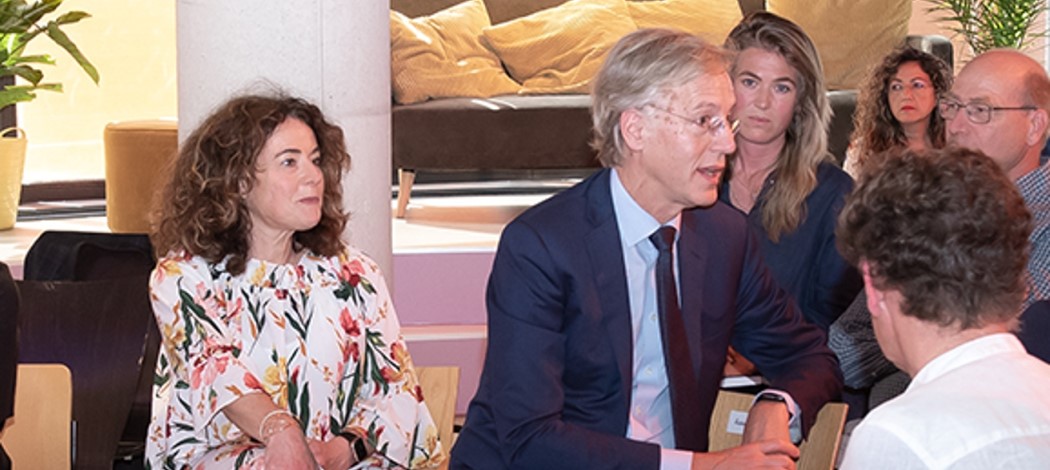
Photo: Monique Kooijmans
Robbert Dijkgraaf, Dutch Minister of Education, Culture and Science, visited Amsterdam’s universities on Wednesday, 13 July. Working in cooperation with the Vrije Universiteit Amsterdam (VU), the UvA put together programme to introduce the new minister to higher education in the city. Geert ten Dam, president of the UvA Executive Board, took the minister on a tour of the Amsterdam Ecosystem and explained how the universities work together on the major themes of AI, sustainability and health.
'Speak out'
The afternoon started at the VU for a conversation with students under the heading ‘Speak out’. What is it like to study in Amsterdam today? What do you think could be done better? The minister was curious about how the students saw the future and discussed with them their ideas and suggestions for doing things differently.
Amsterdam as a 'Living Lab'
The afternoon continued on the UvA campus in VOX Pop with an introduction to the Amsterdam ecosystem. The city of Amsterdam can be seen as a 'living lab': a powerful ecosystem in which the two universities work closely together with other knowledge institutions, the municipality and various other partners. With knowledge development and collaboration in the fields of sustainability, health and artificial intelligence, the ecosystem actively contributes towards solving some of society’s most complex issues, such as how to increase equality of opportunity in the city or future-proof the water system in times of climate change. Ten Dam: ‘Amsterdam as a "living lab" has a unique starting position: we are all literally within cycling distance from each other, we have a rich environment with a multitude of partners, both private and public. This is a unique ecosystem and is rich with opportunities.’
Researchers from the UvA and the VU gave presentations on how collaboration takes shape and how research contributes to solving social issues. For example, the minister was updated about the collaboration in Amsterdam within the AI Technology for People coalition. Then Reinout Wiers (UvA) and Claudi Bockting (Amsterdam UMC) explained how the Centre for Urban Mental Health contributes to a psychologically healthy city.
Pitches on reducing workload pressures
The minister is aware that the workload in higher education is high. But what steps have the UvA and the VU already taken to help reduce the workload pressure? Wilma de Munck, chair of the (former) Workload Committee, and director of Operational Management at the Faculty of Economics & Business, spoke on that topic at the end of the afternoon. Employees from both universities then presented their approach to reducing work pressure in ultra-short pitches.
De Munck: ‘Working at a university is and always will be a high-level undertaking and will always lead to work pressure. That is not a bad thing. This is what we choose to do. But the workload should not exceed the capacity of our people and lead to a loss of job satisfaction.’
This article was first published on 14 July by University of Amsterdam.





 A unique international forum for public research organisations and companies to connect their external engagement with strategic interests around their R&D system.
A unique international forum for public research organisations and companies to connect their external engagement with strategic interests around their R&D system.